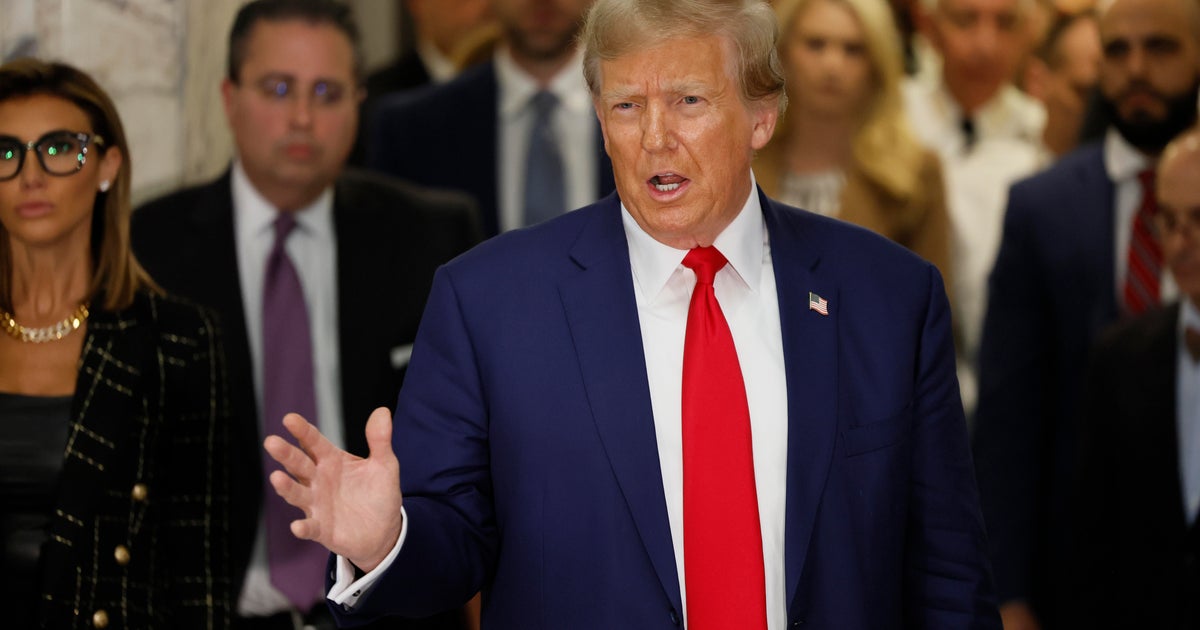CBS News
Alabama woman doing well after gene-edited pig kidney transplant: “It’s like a new beginning”

A 53-year-old Alabama woman is now free from years of dialysis after receiving a pig kidney transplant last month.
Towana Looney, who is recovering from the procedure, is the fifth American given a gene-edited pig organ — and notably, she isn’t as sick as prior recipients who died within two months of receiving a pig kidney or heart.
“It’s like a new beginning,” Looney told The Associated Press. Right away, “the energy I had was amazing. To have a working kidney — and to feel it — is unbelievable.”
Looney’s surgery marks an important step as scientists get ready for formal studies of xenotransplantation — the use of an animal organ for transplant — expected to begin next year, said Dr. Robert Montgomery of NYU Langone Health, who led the highly experimental procedure.
More than 100,000 people are on the U.S. transplant list, most of whom need a kidney. Thousands die waiting and many more who need a transplant never qualify. Now, searching for an alternate supply, scientists are genetically altering pigs so their organs are more humanlike.
This research has been decades in the making and could help many others who need organs, said CBS News chief medical correspondent Dr. Jon LaPook, who is also a professor of medicine at NYU Langone.
“Just in the last year now, we have these xenotransplantations, which means you’re having an animal organ and it’s going into a human,” LaPook said on “CBS Mornings Plus” Tuesday. “The interesting thing here is what they did is they fiddled with the gene. So there were, like 10 gene edits that made the pig kidney more compatible with humans. They put it in, and it’s working.”
Shelby Lum / AP
Looney is recuperating well after her transplant, which was announced Tuesday. She was discharged from the hospital just 11 days after surgery to continue recovery in a nearby apartment although temporarily readmitted this week while her medications are adjusted. Doctors expect her to return home to Alabama in three months. If the pig kidney were to fail, she could begin dialysis again.
“To see hope restored to her and her family is extraordinary,” Dr. Jayme Locke, Looney’s original surgeon who secured Food and Drug Administration permission for the Nov. 25 transplant, told the AP.
Looney’s need for a kidney follows a long health journey. In 1999, Looney donated a kidney to her mother, but a complication during pregnancy caused high blood pressure that damaged her remaining kidney, which eventually failed. It’s incredibly rare for living donors to develop kidney failure although those who do are given extra priority on the transplant list.
But Looney couldn’t get a match — she had developed antibodies abnormally primed to attack another human kidney. Tests showed she’d reject every kidney donors have offered.
“She ended up being on dialysis for the last eight years, on the renal transplant list for seven years, but she has sort of unusual antibodies that made her not a good donor recipient candidate for 99.99% of potential donors,” LaPook explained.
Then Looney heard about pig kidney research at the University of Alabama at Birmingham and told Locke, at the time a UAB transplant surgeon, she’d like to try one. In April 2023, Locke filed an FDA application seeking an emergency experiment, under rules for people like Looney who are out of options.
The FDA didn’t agree right away. Instead, the world’s first gene-edited pig kidney transplants went to two sicker patients last spring, at Massachusetts General Hospital and NYU. Both also had serious heart disease. The Boston patient recovered enough to spend about a month at home before dying of sudden cardiac arrest deemed unrelated to the pig kidney. NYU’s patient had heart complications that damaged her pig kidney, forcing its removal, and she later died.
Those disappointing outcomes didn’t dissuade Looney, who was starting to feel worse on dialysis but, Locke said, hadn’t developed heart disease or other complications. The FDA eventually allowed her transplant at NYU, where Locke collaborated with Montgomery.
Even if her new organ fails, doctors can learn from it, Looney said: “You don’t know if it’s going to work or not until you try.”
Blacksburg, Virginia-based Revivicor provided Looney’s new kidney from a pig with 10 gene alterations. Moments after Montgomery sewed it into place, the kidney turned a healthy pink and began producing urine.
Looney was initially discharged on Dec. 6, wearing monitors to track her blood pressure, heart rate and other bodily functions and returning to the hospital for daily checkups before her medication readmission. Doctors scrutinize her bloodwork and other tests, comparing them to prior research in animals and a few humans in hopes of spotting an early warning if problems crop up.
“A lot of what we’re seeing, we’re seeing for the first time,” Montgomery said.
During a visit last week with Locke, who now works for the federal government, Looney hugged her longtime doctor, saying, “Thank you for not giving up on me.”
“Never,” Locke responded.
CBS News
Luigi Mangione indictment announced for UnitedHealthcare CEO murder caae

Watch CBS News
Be the first to know
Get browser notifications for breaking news, live events, and exclusive reporting.
CBS News
Trump lawyers allege juror misconduct in New York criminal case

President-elect Donald Trump fired another salvo in his long-running effort to have his New York criminal conviction tossed, with his attorneys alleging earlier this month that there was juror misconduct during his trial.
In a previously undisclosed Dec. 3 letter to Justice Juan Merchan that was made public Tuesday, Todd Blanche and Emil Bove wrote that there was “grave juror misconduct” in the proceedings in a Manhattan courtroom earlier this year.
However, heavy redactions in the letter and subsequent exchanges with prosecutors obscured almost all information about the accusations themselves.
“The jury in this case was not anywhere near fair and impartial,” they wrote.
Merchan on Tuesday directed Trump to make the redacted letter public, and instructed prosecutors to publish their own redacted responses. The judge also criticized Trump’s lawyers for making such serious allegations without sworn statements.
Prosecutors called the allegations “vague accusations of juror misconduct” in one of their responses. They claimed Trump’s attorneys did not want to have the allegations subject to investigation or a public hearing.
“Notwithstanding the import of their allegations, counsel do not request and in fact oppose a hearing at which their allegations could be fully examined, referring to such a hearing as ‘invasive fact-finding,'” wrote a prosecutor for Manhattan District Attorney Alvin Bragg.
Still, they argued such an investigation wasn’t yet appropriate.
“Counsel’s allegations fall far short of the standard required to request such a hearing in any event,” they wrote.
It is unclear if the allegations relate to a June 7 letter from Merchan that alerted prosecutors and Trump’s attorneys to a comment left on the court’s Facebook page the night before Trump’s conviction.
“My cousin is a juror and says Trump is getting convicted,” the user wrote. “Thank you folks for all your hard work!!!!”
The person who made the comment had previously described themselves as a “professional s**tposter.”
Trump was found guilty in May of 34 counts of falsifying business records, connected with a scheme to cover up a “hush money” payment to an adult film star. He pleaded not guilty and is contesting the conviction on multiple fronts.
CBS News
Japan’s Honda and Nissan to begin merger talks, report says

Japanese automakers Honda Motor and Nissan Motor are reportedly entering merger talks to help them compete against Tesla and other electric vehicle makers, according to the Nikkei financial newspaper.
The two firms are considering operating under a single holding company, and are expected to sign a memorandum of understanding for the new entity, according to the Tokyo-based Nikkei.
The paper also reports that Honda and Nissan are considering bringing in Mitsubishi Motors, of which Nissan is the top shareholder, under the holding company to create one of the world’s largest auto groups.
In a statement to CBS MoneyWatch, Nissan said it has not announced the details in the report, but that the two companies “are exploring various possibilities for future collaboration, leveraging each other’s strengths,” which it announced in March.
Honda did not immediately respond to CBS MoneyWatch’s request for comment.
In March, Japan’s number two and three automakers, after rival Toyota, deepened ties when they agreed to explore a strategic partnership on electric vehicles.
Analysts characterized the move as one that is aimed at helping the automakers catch up with Chinese competitors, including BYD, which have captured more market share, while Japanese firms have lost ground by focusing more on hybrid vehicles.
China overtook Japan as the world’s biggest vehicle exporter in 2023, aided in part by its dominance in the electric car space.
Honda announced plans in May to double its investment in electric vehicles to $65 billion by 2030, as part of a target set three years ago of achieving 100% EV sales by 2040.
Similarly, Nissan in March announced that 16 of the 30 new models it plans to launch over the next three years would be “electrified.”
Climate concerns drive demand
The world’s auto giants are increasingly prioritizing electric and hybrid vehicles, with demand growing for less polluting models as concern about climate change grows.
At the same time, however, consumer demand for EVs has slowed amid high prices, range anxiety and developing infrastructure around charging points.
Hybrids that combine battery power and internal combustion engines have remained popular in Japan, accounting for 40% of sales in 2022.
But Japanese firms’ focus on hybrids has left them in the slow lane in meeting the growing appetite for purely electric vehicles. Just 1.7% of cars sold in Japan in 2022 were electric, compared to 15% in western Europe and 5.3% in the United States.










